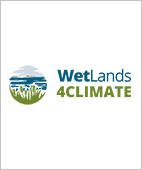
LIFE Project: Management and restoration of Mediterranean wetlands as carbon sinks
- Type Project
- Status Filled
- Execution 2020 -2024
- Assigned Budget 2.165.389,00 €
- Scope Europeo
- Autonomous community Castilla y León
- Main source of financing LIFE
- Project website Web del proyecto
LIFE WETLANDS4CLIMATE aims to establish management guidelines for Mediterranean wetlands to function as carbon sinks, while maintaining their ecological integrity and functionality to provide a full range of ecosystem services.
Wetlands are disappearing three times faster than forests. Policies, plans, and programs have underestimated their functions, and there is insufficient information to ensure adequate recording of their greenhouse gas (GHG) emissions. The inherent complexity of managing these ecosystems is likely the main barrier behind this situation.
Traditionally, wetlands have been considered net emitters of GHGs. Recent studies have shown, however, that this is not always the case, at least in coastal and saltwater lagoons and wetlands. This opens up a new scenario in which wetland conservation not only contributes to biodiversity conservation but also serves as a tool to combat climate change.
- Maximize the carbon sink function of Mediterranean wetlands through practical management actions and monitoring indicators, to demonstrate that such management is aligned with biodiversity conservation.
- Transfer the lessons learned to other Mediterranean wetlands in Spain and Europe.
- Transfer the tools, measures, best practices, and lessons learned to public land managers (local, regional, and European bodies).
- Replicate the methodology at European level in other wetlands.
- Engage the private sector in financing climate change mitigation and adaptation measures focused on water and wetland management.
- Contribute to achieving the Paris Agreement through improved management and conservation of wetlands in the EU.
- Integrating wetland management and conservation with EU objectives and climate change mitigation.
- Design of a practical protocol to assess the capacity of wetlands as carbon sinks, defining the influence of different environmental variables and management actions, and generating management recommendations.
- Creation of a Monitoring and Knowledge Transfer Committee, in which competent authorities/agencies, experts, and stakeholders interested in wetland management and climate change participate and coordinate.
- Definition of 30 management measures (related to vegetation, soil, and water) that increase the capacity of wetlands as carbon sinks. Definition of management matrices and evaluation of different measures to establish offsets related to ecosystem services, with particular attention to carbon sequestration and climate change mitigation.
- Management guidelines for enhancing the carbon sink function of coastal and saline wetlands, and a database of results on carbon cycle process rates and other management indicators.
- Indicators for monitoring vegetation, soil, and water management measures, including indicators of the ecological status of wetlands.
- Assessment of the socioeconomic impact of the measures, economic study of the profitability and competitiveness of the different management models, including public use, and sociological study of the level of acceptance of wetlands and the Natura 2000 Network.
- Presentations at approximately 10 events, including national and international conferences, and publications in high-impact scientific journals. Approximately 100,000 people were informed about the project, a documentary and 10 short videos were released, and 30 newscasts were broadcast on local and national television.
- Training of 60 wetland managers and transfer to at least six other EU countries.
- Transfer of results to legislative proposals at the regional, national and European levels, with the support of entities dedicated to climate change and/or wetlands (30 entities) such as RAMSAR or IPCC.
- Methodology submitted to the international standard of the voluntary carbon market on the restoration of Mediterranean coastal and saline wetlands, quantifying greenhouse gas sequestration in wetlands for inclusion in the voluntary carbon market
- Coordinator/entity name: Amanda del Río Murillo
- Postal address: Corro del Postigo, 1, 34337, Fuentes de Nava
- Coordinator/entity email:
The project is directly linked to the EU climate change policy objective of at least a 40% reduction in GHG emissions compared to 1990 by 2030; the EU Biodiversity Strategy's 2030 goal of restoring degraded and carbon-rich ecosystems; and the LULUF (Land Use, Land-Use Change and Forestry) policy by providing a methodology for quantifying GHG emissions and promoting the carbon sink function of wetlands.
It is also aligned with the objectives of the EU Water Framework Directive, the Habitats Directive, and the Birds Directive to restore wetlands for their ecosystem services, habitats, and species; as well as with the global Aichi Biodiversity Target 15 on ecosystem resilience and carbon stocks.
- Fundación Global Nature
- UVEG(UNIVERSITAT DE VALèNCIA (UVEG))
- EFE(Agencia EFE SAU, SME)
- VCE (Fundació de la Comunitat Valenciana València Clima i Energia)







